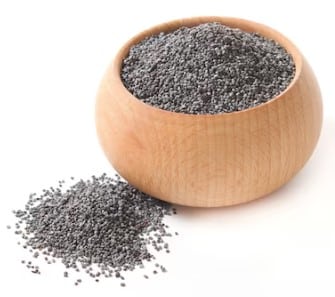

Symptoms of a poppy seed allergy in dogs can include skin rashes or hives, itching or itching of the skin or inside the ears, swelling of the face, red or watery eyes, coughing, sneezing, trouble breathing, and diarrhea. In severe cases, anaphylactic shock can occur, causing extreme breathing difficulty and sometimes even death.
Poppy seed allergies in dogs can be caused by environmental factors such as inhaled allergens in the air, or contact with the actual plant, seeds, or process products of poppy seed processing like dust, oil and flour. Dogs may also have an immunologic reaction to the poppy seed protein itself.
Diagnosing a poppy seed allergy in dogs typically involves taking a thorough history from the pet’s owner and performing a physical examination to confirm the presence of symptoms. Blood tests and/or skin tests may be ordered to determine if the dog is allergic to poppy seeds. It is important to note that an allergic reaction may not occur until after the dog has been exposed to poppy seeds on several occasions, so it is important for the owner to monitor the pet’s health closely.
A poppy seed allergy in dogs is a serious condition that could be life-threatening if left untreated. If anaphylactic shock occurs, the mortality rate is high. It is important to seek immediate veterinary care if symptoms of an allergy develop.
For treatment of a poppy seed allergy in dogs, one should immediately take the dog to a veterinarian. The veterinarian may prescribe an antihistamine to help reduce the effects of the allergic reaction, as well as corticosteroids or other medications to reduce inflammation and itching. In more serious cases, the dog may need to be hospitalized and given intravenous fluids and other medications. In extreme cases, an emergency tracheotomy may be necessary to ensure the dog can breathe.
The best prevention methods for a poppy seed allergy in dogs include avoiding foods that contain poppy seeds, regular grooming to ensure that any traces of poppy seeds are removed from the coat and skin, and talking to your veterinarian about an appropriate hypoallergenic diet. It is also important to keep potentially allergenic substances such as pollen and dust out of the home environment. Finally, regular trips to the vet for check-ups, vaccinations, and testing can help detect and treat any allergy or other medical issues quickly.
A poppy seed allergy in dogs is not contagious and it cannot affect humans. However, if a person is allergic to poppy seeds, they should take precautions when handling a dog that has a poppy seed allergy.
Some home remedies for managing a poppy seed allergy in dogs include providing a hypoallergenic diet, avoiding environmental sources of poppy seeds, not giving your dog over-the-counter antihistamines, and using a flea and tick preventative monthly. Additionally, natural remedies such as oatmeal baths, aloe vera, and coconut oil may help soothe the skin.
While these home and natural remedies can be useful for managing poppy seed allergies in dogs, it’s important to note that they are not guaranteed solutions. If you think that your dog may be suffering from a poppy seed allergy, it’s best to consult with a veterinarian for a professional opinion.
Possibly the most commonly affected dog breeds with a poppy seed allergy are Terriers, Poodles, and Chihuahuas. Other susceptible breeds include Bulldogs, German Shepherds, Fox Terriers, Maltese, Bichon Frise, cocker Spaniels, and Shih Tzus. Symptoms of a poppy seed allergy in dogs may include skin rashes, hair loss, excessive itching and scratching, and gastrointestinal disorders.
Have you ever had to worry about a poppy seed allergy in your dog? If so, what was their response when you noticed the symptoms? How did you feel when you realized they were having an allergic reaction? What steps did you take to manage the problem?
No matter what your experience may have been, we hope that your dog is now safe and healthy. Take care of yourself and your beloved pet. Remember that you are not alone in this journey.